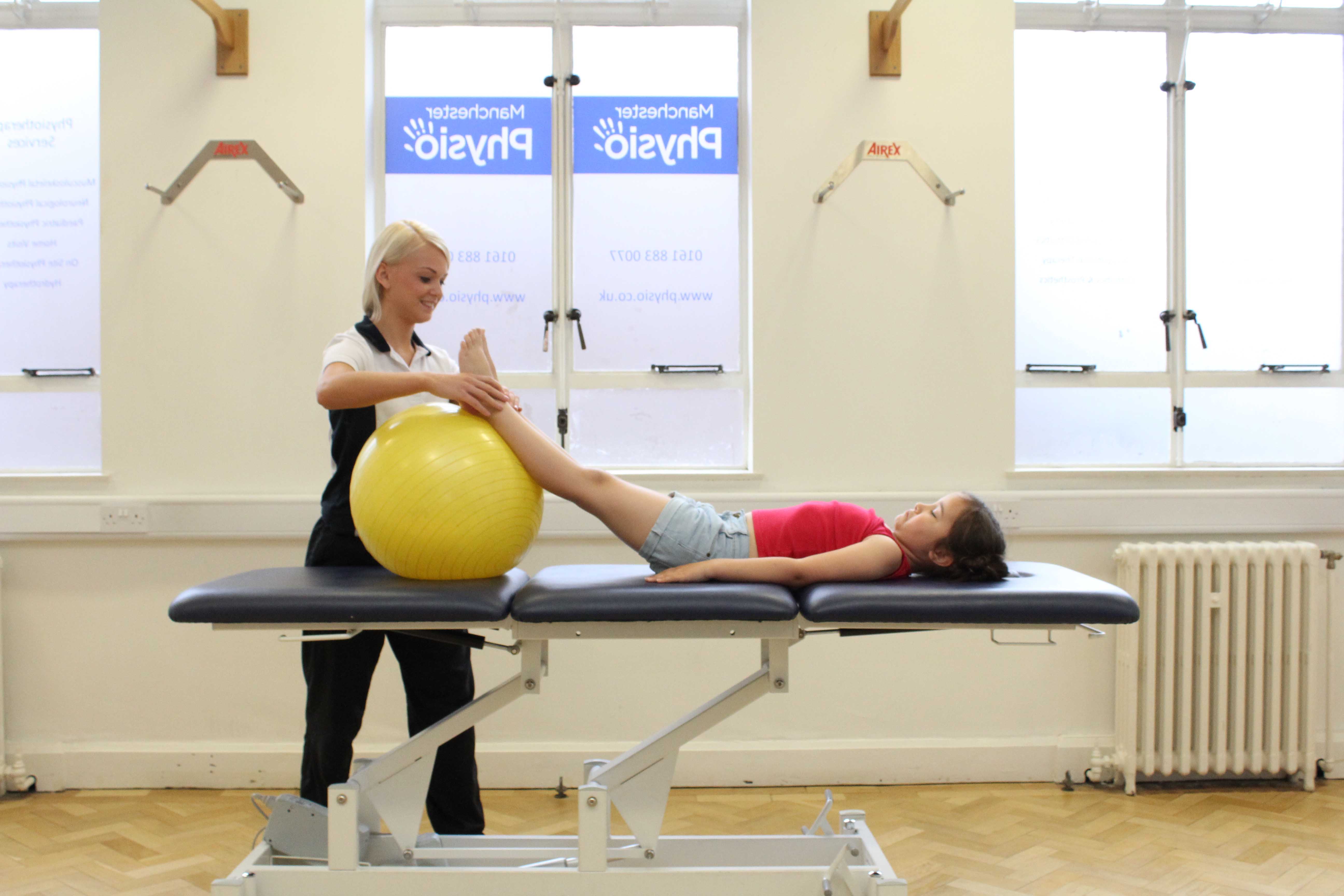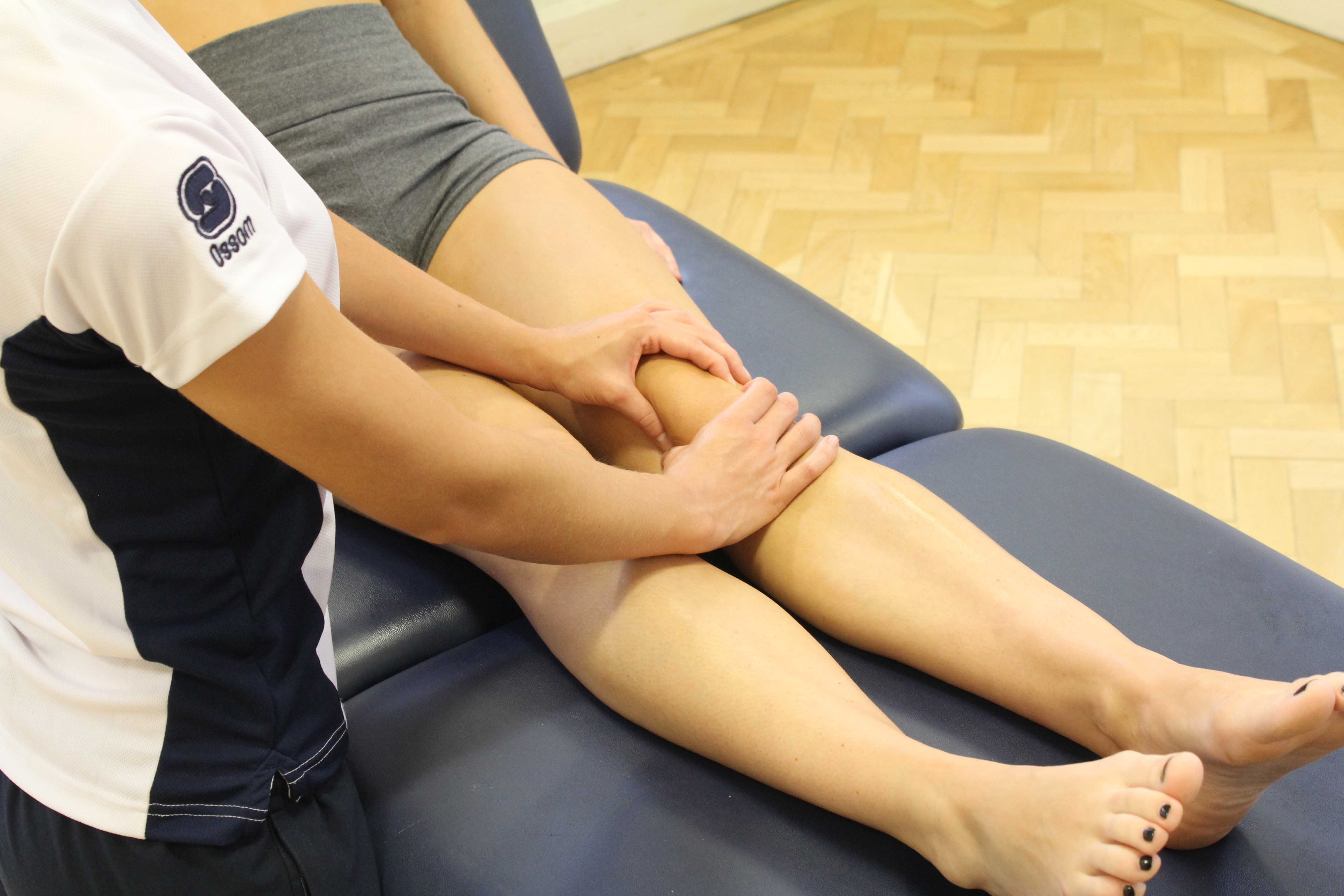What is knee pain in children?
Knee pain in children can be a result of many factors. Most commonly it is a result of overuse in active teenagers, but can also be caused by a specific trauma or condition.
It is quite common for children to complain of knee pain without having sustained any type of trauma or injury, especially active adolescents. A change in activity level or sport may be related to the onset of symptoms, usually the onset of knee pain will occur after a considerable delay.
 Above: Massage and mobilisation of the knees to relieve pain and stiffness
Above: Massage and mobilisation of the knees to relieve pain and stiffnessWhat causes knee pain in children?
The most common reason for knee pain in children is due to overuse. The anatomy of a child’s knee joint is extremely sensitive to small problems in alignment, training, and overuse. Pressure may pull the kneecap sideways out of its groove, causing pain around kneecap. This is often referred to as anterior knee pain. In teenagers, a number of factors may be involved.
- Imbalance of thigh muscles that support the knee joint
- Poor flexibility
- Problems with alignment
- Using improper sports training techniques or equipment
- Overdoing sports activities
- anterior cruciate ligament injury
- posterior cruciate ligament injury
- lateral collateral ligament injury
- medial collateral ligament injury
- Dislocated kneecap
- Osgood-Schlatter’s disease
- Sinding-Larsen Johansson syndrome
- Juvenile Arthritis
- Osteochondritis dissecans
To arrange a physiotherapy appointment call Physio.co.uk on 0330 088 7800, or book online
 Above: Mobilisations of the knee to relieve pain and stiffness
Above: Mobilisations of the knee to relieve pain and stiffnessWhat are the symptoms of knee pain in children?
Commonly in anterior knee pain the pain usually begins gradually, and worsens as activity levels increase. Pain might flare up when your child does activities that repeatedly bend the knee (jumping, running, and other exercises). Without treatment, your child might also develop thigh muscle (quadriceps) muscle weakness. Your child’s knees may begin to buckle or give way due to pain.
If the knee pain is a result of trauma your child might experience popping or crackling sounds in the knee when they climb stairs, stand up or walk. This might lead to them experiencing an unstable knee that may; click, lock or give way (instability). . This is usually a result of a ligament injury.
If your child has knee pain that is restricting their day to day activities; if they are unable to bear weight on the leg, or if the knee is red or swollen, then you should see your doctor as an x-ray or MRI scan may be needed.
What should I do if my child has knee pain?
Ice, rest, and rehabilitation are the usual treatments for children with knee pain.
- Ice: To relieve swelling and inflammation, apply ice wrapped in a towel to your sore knee.
- Rest: Until the tissues heal, stop doing the activities that make your knee hurt.
- Rehabilitation: A physiotherapist will help ease the pain and reduce any swelling. The physiotherapist will then begin to rehabilitate your child’s knee to regain range of motion, strength, power, endurance, speed, agility, and coordination.
What shouldn’t my child do if they have knee pain?
Until they have been assessed by a physiotherapist your child should avoid any activity that brings about knee pain, locking, clicking, or giving way.
Physiotherapy for knee pain in children
A comprehensive knee assessment by one of our physiotherapists will help determine the cause of pain behind your child’s knee pain and rule out other problems.
The physiotherapist may also check:
- Alignment of the lower leg, kneecap, and quadriceps
- Knee stability, hip rotation, and range of motion of knees and hips
- The kneecap for signs of tenderness
- The attachment of thigh muscles to the kneecap
- Strength, flexibility, firmness, tone, and circumference of thigh and hamstring muscles
- Tightness of the Achilles tendon and flexibility and position of the feet
To arrange a physiotherapy appointment call Physio.co.uk on 0330 088 7800, book online or alternatively request a free phone consultation.
Does knee pain in children cause any long-term effects?
With the correct physiotherapy input most childhood conditions causing knee pain will resolve and will not result in any long term knee pain.
To arrange a physiotherapy appointment with a physiotherapist with experience of treating childood call Physio.co.uk on 0330 088 7800, book online or alternatively request a free phone consultation.

 0330 088 7800
0330 088 7800


































